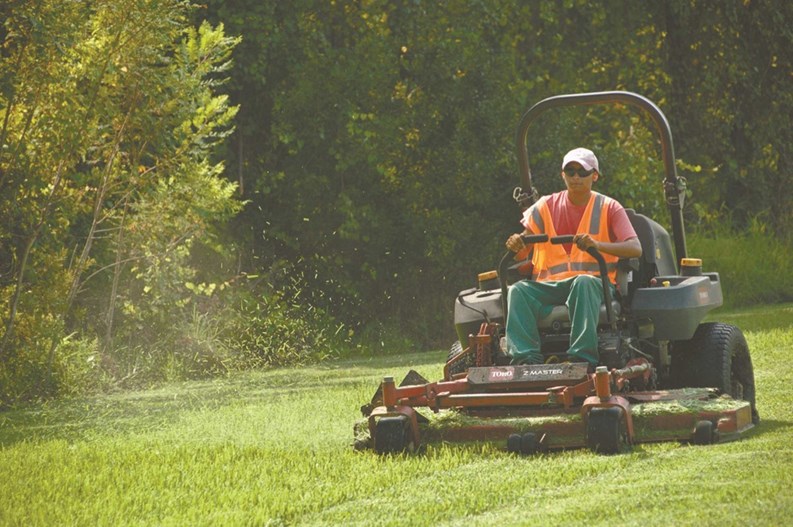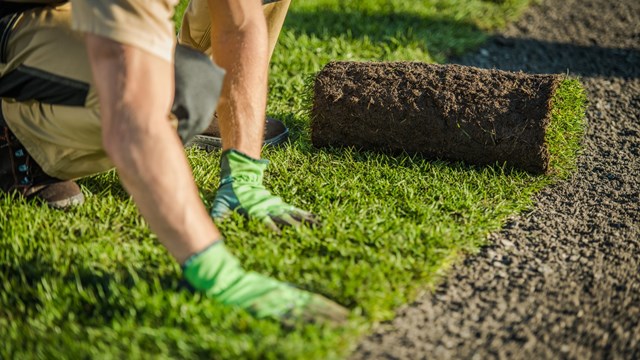New Jersey is not exactly known for year-round sunshine and palm trees swaying in the breeze. New Jerseyans as do many Northeast residents and most Americans, have a love affair with lush green turf.
Keeping grass green in the Garden State’s widely varying climate where winter temperatures can average below freezing and summer months can bring triple digit temperatures, can be a challenge. And don’t forget those frosty, winter blasts off of the Atlantic Ocean that can wreck havoc on the healthiest lawn.
Condominium and homeowners associations often find landscaping and lawn care the largest line item in the budget after insurance. Landscaping also adds to a property’s real and perceived value, not only for current residents, but for those seeking a new address to call home.
Nothing ups the ante on curb appeal quite like well-maintained landscaping and colorful plants and now that the winter snow has melted and warmer weather is around the corner, the attention of property owners and property managers turns to one common task: creating a healthy and attractive lawn.
Winter Greens
Bradley Park, a Rutgers University professor of Plant Biology and Pathology believes that only the heartiest most durable grasses should be used for New Jersey lawns. “Cool-season turf grasses are the most predominant in New Jersey,” he says. “These include Kentucky bluegrass, perennial ryegrass, tall fescue, and fine fescues. Some lawn and ground locations consist of zoysiagrass, a warm-season turf grass.”
“Popular ground covers in New Jersey are English Ivy, Pachysandra, and Vinca,” says Nelson Lee, president of Landscapeworks, Inc. in Hawthorne. “Our geographic area and climate allows those ground covers to be sustainable.”
“Tall fescue is the easiest of species to manage in New Jersey,” adds Christopher Merkler, director of sales for Down To Earth Landscaping in Jackson. “Fescues are by far the most drought and disease tolerant of species and can adapt to the climactic conditions of New Jersey without much effort. Additionally, tall fescues require far less maintenance in terms of less frequent fertilizations and chemical applications when properly cared for.”
It Ain’t Easy Being Green
An attractive lawn doesn’t just happen over night. It requires effort and maintenance. The problems associated with lawn upkeep in New Jersey can be unique. Urban pollution, salt exposure and snow plow damage and other stresses here can present a whole different set of challenges compared to most other states. There are a number of funguses and diseases that can afflict a New Jersey lawn.
“Fungus is a big problem with New Jersey lawns in the summer because of the humidity,” says Lee. “Over-watering also causes fungus. You want to make sure you are not under-watering or over-watering. That’s very important. You want at least one inch per week. There’s a whole process but the easiest way to do it is put a coffee can out while you’re sprinkling and accumulate the water and then do the measuring.”
“Summer annual weed invasion is a common lawn problem in New Jersey,” says Park. “Crabgrass is the most prevalent. Common lawn problems often involve poor management such as infrequent mowing, particularly during spring months when turf is growing most rapidly. When lawns are mowed more frequently, turf grass clippings can easily be returned to the lawn without excessive clumping and potential smothering of the turf. Returning the clippings has the effect of recycling essential nutrients back into the turf system as well as reducing yard waste.”
Experts interviewed say that the most obvious sign of a serious lawn problem is discoloration. When a lawn turns brown it could be a sign of an insect infestation.
“Browning out in areas of the lawn could be a serious sign of disease or insect damage,” says Mark Erickson, turf specialist and account manager of ValleyCrest’s Landscape Maintenance branch in Norristown, Pennsylvania. “Another sign is birds eating the grass or rodents tunneling just under the surface. This sometimes means there are insects present in the turf that may start to cause damage.”
Don’t Bug Out
“There’s a big insect problem in New Jersey, especially chinch bug and grubs,” says Lee. “The grub is a larvae, it’s a Japanese beetle so it’s like the caterpillar form and what they do is feed on the roots of the grass. Most of the time people will see animals digging in the ground and usually they are trying to dig for grubs because that’s what they eat, especially skunks. Grubs eat the roots, so there is no root system. So if you have grubs you can pull your lawn back like a rug,”
There are a number of things a homeowner or groundskeeper can do on their own to keep their lawn attractive and healthy.
“Homeowners and groundskeepers should mow at a frequency such that individual mowings remove no more that one third of the turf grass leaf issue,” says Park. “For example, to maintain turf at a mowing height of 2.0 inches, the turf should not be allowed to get any higher than 3.0 inches before it is mowed. This often requires mowing a minimum of twice-per-week during periods of active turf growth. Mowing should not be performed on non-irrigated turf sites when turf is dormant (i.e. summer drought periods).”
“Soil testing is very important so you’ll know how to properly fertilize,” says Lee. “All you have to do is dig up some soil and send it to a lab. Rutgers University offers an analysis for a pretty minimal amount of money.”
Merkler agrees with Lee that soil testing is important for the upkeep and maintenance of lawns. “New Jersey is very unique because the soil conditions can differ dramatically throughout the state,” he says. “Performing soil testing regularly to determine pH and nutrient levels can help proactively counteract the problems that could potentially occur. Most times, lawn issues can be corrected by making sure that the soil in the lawn that is growing is best-suited for the lawn species. Some turf grass species prefer higher or lower soil acidity and limiting rates can be determined by testing the soil.”
When it comes to weeding and feeding the landscape there are a host of environmentally-friendly products on the market. In the hands of a certified lawn care professional, these products will enhance the lawn and landscaping. At no time should an untrained person apply these products since there are so many variables involved with a correct application.
Lawn care professionals believe that the most vital factor in maintaining a lawn is fertilization and a proper program for New Jersey would be to do an effective crabgrass preventative in the spring with a pre-emergent followed by a solid program that has four pounds of nitrogen per thousand square feet for fertilizing.
Park believes that there are specific months that certain lawn-care tasks should be undertaken. “Lawn establishment using cool-season turf grasses in New Jersey is best performed during mid-August through late-September.”
“Ultimately, knowing the type of lawn that you have and which conditions it is best suited for is probably the best practice prior to any work being performed,” says Merkler. “For instance, a tall fescue lawn, a cool season turf grass species, is far more drought tolerant than a Kentucky bluegrass lawn. Knowing this information is very useful in knowing how much irrigation is necessary and when watering should be performed. Keeping a history of pests and problematic items is very useful in determining a plan for managing landscapes and turf. Also, a bit of education from you local agricultural extension can provide one with the information necessary to treat any problems. For example, when an insect population is present, it is best to identify the exact species of insect as different insect control products function differently for each type of pest.”
Common Mistakes
Lawn care professionals say that the most common mistakes homeowners make when caring for their lawn is over-watering and mowing the blades too short but there are other mistakes homeowners make that they are unaware of.
“Lawns may have significant voids in turf cover in early spring months,” says Park. “Homeowners will often seed their lawn during this time, yet negate their seeding efforts by applying a pre-emergence herbicide for crabgrass control soon after seeding. Homeowners may waste money on lime applications in lieu of performing soil testing. Lime has the effect of raising soil pH; however, without knowing the soil pH (accomplished by testing the soil) there is no way of knowing if lime is necessary and at what rate it should potentially be applied.”
“Over applying or under-applying chemicals and fertilizers are a few common mistakes people make when caring for their lawns,” says Merkler. “Manufacturer’s recommendations should always be followed and inspections should be performed periodically. Sometimes less is more and adhering to the recommendations is always the best practice.”
“A common mistake people make is not timing the crabgrass pre-emergent treatment right,” says Erickson. “Then they end up fighting crabgrass all year long.”
When shopping for expert lawn maintenance advice or services, the Internet and websites are an excellent way to do the homework and research. Experts note that many lawn maintenance companies offer free consultations and design options, but use the Internet as a tool and then call in the professionals. Landscaping and lawn maintenance are not an area for even the most robust HOA or community association to undertake. The climate conditions, pests, and weeds native to New Jersey are challenging for even a seasoned professional. Hire the best company available to your association and then relax and enjoy the view.
Anne Childers is a freelance writer and a frequent contributor to The New Jersey Cooperator. Staff Writer Christy Smith-Sloman contributed to this article.






Leave a Comment